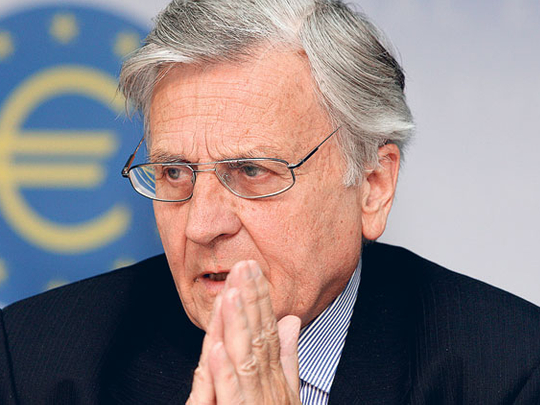
It is meant to be an example of European unity, but in response to the euro zone's fiscal crisis the European Central Bank (ECB) is having a fight on several national fronts.
Even as the bank's dealers were pushing cash into the bond markets of selected euro zone countries, its president, Jean-Claude Trichet, was trying to reassure Germans that the ECB had not lost its inflation-fighting zeal or its independence. He told Der Spiegel that it was "ridiculous" to believe that the decision to buy bonds, in the early hours of May 10, was in response to political pressures. In a separate interview, he insisted that the bank's monetary policy was unchanged and that its actions would not spur inflation.
To back up that claim, the central bank conducted a special auction of one-week deposits on May 18 to "sterilise", or soak up, 16.5 billion euros (Dh75.26 billion) of cash it had created by buying bonds. Banks offered almost 10 times what was required, which meant the ECB had to pay an interest rate of just 0.28 per cent.
The exercise was largely cosmetic given how much liquidity the ECB supplies to banks. But appearances count. "It's as if the ECB has sinned and has to do penance," says Julian Callow at Barclays Capital.
Fragile finances
How did it get into such a pickle? In part because flaws in the construction of the euro left Trichet with little choice: there was no other institution in place to help individual countries in crisis. The mainstay of the mutual-support package announced on May 10, a 440 billion euro "special-purpose vehicle" that will guarantee loans to governments, will eventually fill that gap. Meanwhile, the ECB had to mount a holding operation. The alternative might have been financial collapse.
But the ECB shares some of the blame.
One failing was not to anticipate sooner that banks in countries with fragile public finances and large private debts could be cut off from foreign finance. Its policymakers were too attached to the idea that the euro protects against all ills. In the early months of the global financial crisis, the ECB's governing council insisted that "the euro area does not suffer from major imbalances".
This was both a dig at America (with its big current-account deficit) and a statement of startling complacency.
A divide between high-saving, asset-rich and productive countries in the north and an uncompetitive, debt-ridden south is the source of the euro zone's present troubles. Yet as recently as March, Trichet was boasting about the "special" virtue of the euro in securing cross-border financing for its members.
Undimmed
This sense of unique European merit is undimmed. Asked by Der Spiegel to respond to German fears about inflation, Trichet said the ECB's actions are "totally different" from the quantitative easing pursued by the Federal Reserve and the Bank of England, because its bond purchases are sterilised. Even so it is struggling to escape the charge that it is providing support for governments' fiscal policies.
That is what many in Germany had long feared. Axel Weber, the head of Germany's central bank, has been publicly critical of the ECB's decision to buy bonds. He is known to be headstrong and a champion of monetarist orthodoxy.
But ECB-watchers think Weber had little choice but to voice his reservations, if only to quell discord within the Bundesbank. "In Germany the feeling is that two red lines have been crossed," says Thomas Mayer at Deutsche Bank — that each country is responsible for its own public finances and that the ECB would never be an agent of fiscal policy.
German anxieties might be pacified were Weber to succeed Trichet when he steps down next year.
Political embrace may cost Fed independence
The decision of the European Central Bank to start buying government bonds follows a path trodden by the Federal Reserve in 2008 and 2009. Both entered politically charged territory to save the financial system at great risk to their reputations. For the Fed, one consequence is that the big financial-reform bill making its way through the Senate will leave it more powerful but more beholden to Washington, DC.
The Fed has fought for, and kept, its supervision of banks. It acquires important new powers to regulate big non-bank financial companies and even to break up firms deemed a threat to the financial system. Its only significant loss of turf is direct oversight of consumer protection. The Fed keeps its emergency-lending powers, though it needs the Treasury's approval to use them (it has usually sought such approval anyway). It cannot lend to failing firms because that job now sits with the Federal Deposit Insurance Corporation under the bill's new resolution authority.
The price of these powers, though, is to be drawn closer into politicians' embrace. Since its birth the Fed's governance has reflected a mix of political and financial influences. Monetary policy is the joint responsibility of governors in Washington, DC, appointed by the president and confirmed by the Senate, and presidents of the reserve banks, some of whose directors are, or are appointed by, bankers.
Critics have long seen the bankers' role in the running of the Fed as an affront to democracy. Under the reform bill the president will now nominate and the Senate will confirm the New York Fed president (the most important of the regional governors). Fed-supervised banks will lose any say in the governance of the reserve banks.












